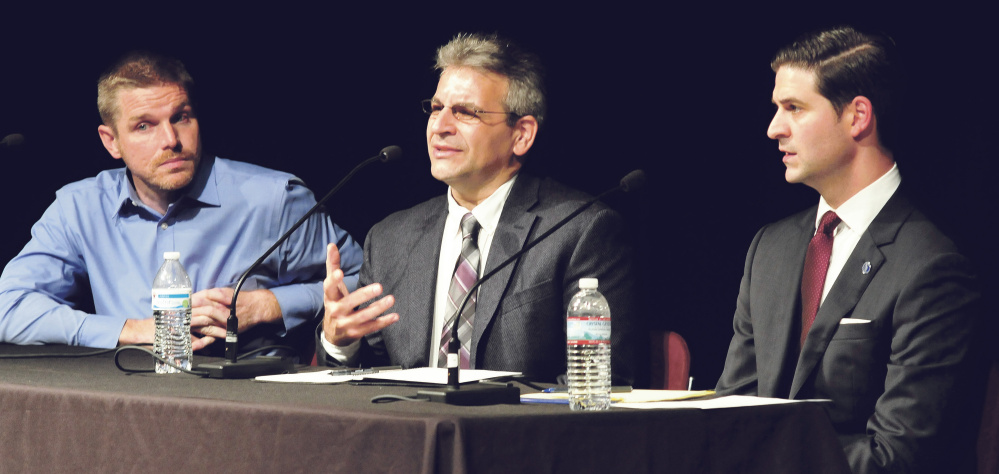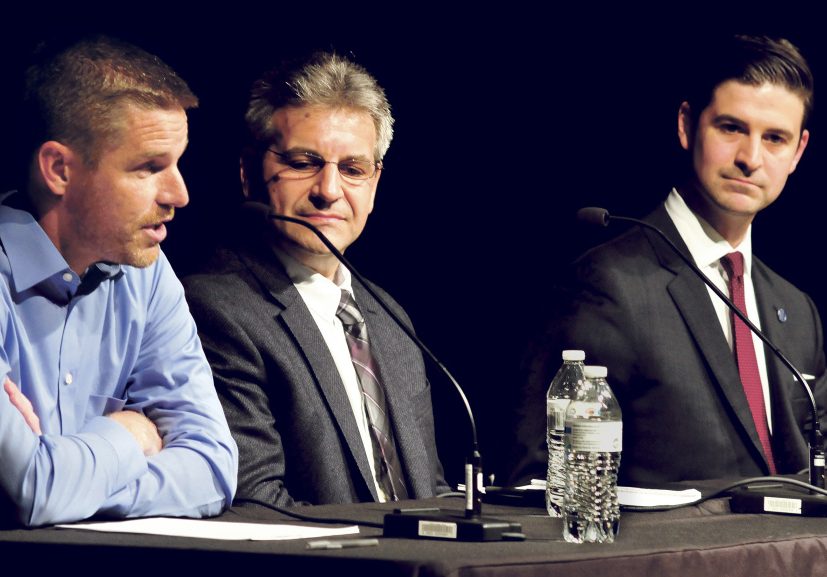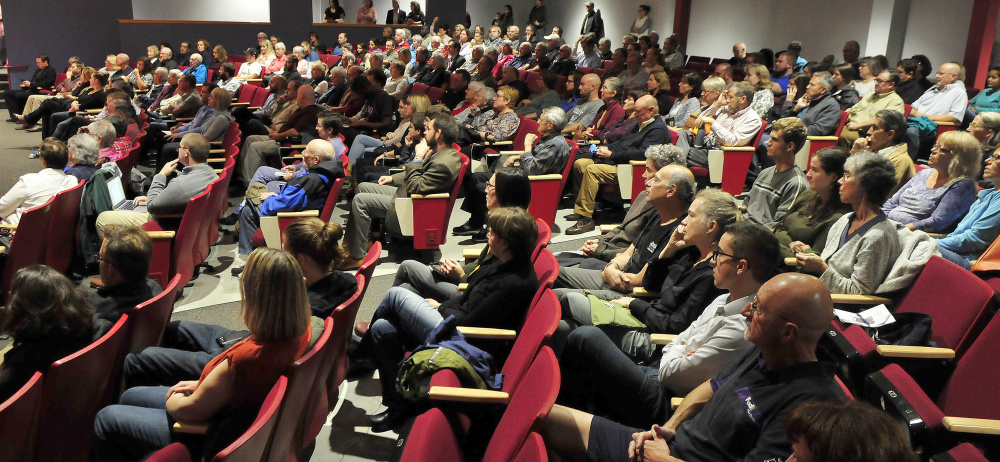WATERVILLE — The mayoral candidates might disagree on some issues, but they made clear Tuesday night that they all want the same thing — to help the city prosper, ensure schools provide good quality education, help create jobs and provide incentives to keep young people here and draw others from away.
About 300 people turned out Tuesday night at Thomas College to hear Mayor Nick Isgro and his challengers, Erik Thomas and John Levesque, talk about why they would be the best mayor for the city over the next three years.
The debate was sponsored by the Morning Sentinel and moderated by Jim Libby, professor of business at Thomas and visiting professor of economics at Colby College, who was facilitating his third mayoral debate in as many years. Scott Monroe, managing editor of the Morning Sentinel and the Kennebec Journal, introduced Libby and welcomed the crowd.
The candidates discussed downtown revitalization, a proposal to change the traffic pattern downtown to two-way, whether to allow medical marijuana dispensaries in the city and how to effect a reasonable tax rate and still provide adequate services.
Isgro, 36, a Republican and assistant vice president and controller at Skowhegan Savings Bank, said the city is achieving great things and has turned a corner over the last three years. Employment is up and new jobs have been created, he said, and the Central Maine Growth Council estimates 350 to 550 jobs will be added in the next two to four years. Isgro said he wants to continue to working on the efforts, including partnering with Colby College on downtown revitalization.
Thomas, 42, a Democrat and former City Council chairman and now self-employed printmaker and concert promoter, said he cares about Waterville, its people and its future.
He said he has spent the last 13 years helping to make the city better through his six years of serving on the board of directors for Waterville Main Street, including three years as vice president, and helping to organize the holiday Parade of Lights, Harvest Fest, Hill in the Ville and other events.
Thomas said that while he is excited about the changes Colby and others have made in Waterville, he is concerned about the fact that schools are underfunded, spending in the bottom 15 percent per pupil in the state. Property taxes are too high, he said, especially for older people on fixed incomes.
Levesque, 46, an independent candidate and education coordinator and consultant for Professional Disability Associates, as well as a trained registered nurse and paramedic, said he is running for mayor because he thinks the city can do better and be more aggressive in drawing businesses to the area including those related to health care, insurance, consulting and legal matters.
“Looking at the right sorts of industries, I think, is key,” Levesque said.
Young people and college graduates tend to leave the city for places where wages are higher and they are more able to pay college loans, but the city could encourage businesses to have loan forgiveness programs where the city could match that forgiveness to a certain point for people who stay in the city, Levesque said.
Isgro, who has worked with Colby’s president, David Greene, downtown businesses and city officials on downtown revitalization, said Colby is investing $45 million in downtown, which has sent shock waves through the commercial real estate world, and more people want to move to the city.
He said he remembers sitting at the table as a representative of the city early on with the Growth Council, Colby officials and the Mid-Maine Chamber of Commerce, talking to CGI Group about why the jobs that company was thinking about bringing to the city were important. That partnership ultimately helped to draw CGI to the city and create jobs, with hundreds more expected.
“These are the kind of partnerships we need to continue to leverage,” Isgro said.
Importantly, residential density downtown will help boost the economy — and already companies have moved to the city from out-of-town, Isgro said, citing Maurice & Son auto body shop, which is building a new home on College Avenue and plans to move there from Fairfield, and Seacoast Security, which moved to the city from Augusta.
Asking a question posed both by the audience and Morning Sentinel, Libby asked the candidates what they think about changing the traffic pattern downtown from one-way to two-way.
Thomas said it is important people realize that it is not a done deal. The City Council voted to allow the city to pursue funding for such an idea, he said.
“There’s still going to be a lot of time for community input,” he said.
Change is hard for people, according to Thomas, who said he thinks what needs to be fixed before the traffic issue is addressed is pedestrian safety downtown. A lot can be done in that regard at no cost, according to Thomas.
“There’s no reason we can’t be dealing with that problem today,” he said.
Isgro said he favors two-way traffic, but people must realize the enormity of the proposal and that a lot of things must be looked at and done before it could happen. Two-way traffic can’t be addressed without addressing The Concourse and how that is set up, according to Isgro, who said he favors the city’s pursuing funding for studying a traffic change.
“… I think we need to realize the size and scope of a project like this. This is huge,” he said.
Levesque said that, as someone who parks a small car downtown, he notices that when he parks next to a sport utility vehicle and tries to back out onto Main Street, he takes his life into his hands. Having parking spaces parallel to the sidewalk would making getting in and out easier, he said.
He said he often parks in Portland, which has many parking garages, and he wants to see a parking garage built on The Concourse. Residents should be given a sticker to park there free and out-of-towners should pay a fee, he said.
“I think something like that makes a lot of sense,” he said.
Asked how they would help expand the city’s tax base, Isgro said that, unfortunately, there is no easy short-term answer and the city really should take the five-to-10-year view. Businesses are moving to Waterville, and that likely will continue, he said.
“I really think that a lot of the projects underway right now are starting to do that,” he said.
Like Isgro, Levesque said the Trafton Road project, where Trafton Properties plans to build a 120,000-square-foot building to expand businesses, is a good project. Trafton partnered with the state Department of Transportation and the city on a project to build an interchange at Interstate 95 off Trafton Road.
Levesque said he works with insurance companies that pay employees well and he thinks that when talking about expanding the tax base in the city it becomes critical to bring the next generation of taxpayers in — people in their 20s, 30s and 40s, looking for jobs in those related industries and encourage college loan forgiveness programs.
“Nick’s right. None of this is simple. Everything’s complicated,” he said.
Thomas also said he thinks the Trafton Road project is important and was a no-risk deal for the city. Thomas said he was on the council in 2014 when it voted to approve the Trafton Road project.
But he said he thinks the city is missing the boat in a couple of ways. College Avenue has infrastructure, but it lacks businesses, and the city needs to do more to encourage them to move there, he said. Also, the city has let residential neighborhoods deteriorate, and because of that, the values have decreased and the properties are not generating as much tax revenue as they could.
If the city can encourage investment in places such as the North End and the South End and help raise property values, that would help expand the tax base, he said. He also said quality schools are a marketing tool and draw people to a community.
Libby said Waterville Senior High School has half the student population it had 40 years ago, and some people talk about cooperating with Winslow on school resources. He asked how far the two communities should go and whether they should consolidate into one high school, for instance.
Levesque said he is “perfectly willing to look at anything as long as quality of education is there.”
Thomas said school consolidation is not something Waterville can do unilaterally — that Waterville officials in the past approached Winslow officials with the idea of one school and Winslow declined. But he said schools are in crisis, that teachers are overworked and stressed, and changes must be made.
Isgro said one thing he wanted to address because it has become divisive is that when taxpayers come in and talk about slowing growth, they get labeled as anti-school.
“It’s not only divisive, but it’s an absolute fallacious argument,” he said.
He said he and City Manager Michael Roy spoke to Winslow officials and they were receptive to discussing consolidation issues.
Regarding drug addiction in the city, Thomas said it is a topic that came up when he knocked on doors. He said he supports restoring the South End police officer position as a first step in helping an underfunded Police Department.
Isgro said the greatest thing the city can do is provide young people economic opportunities. Underemployed and unemployed people look for other things to do and the focus absolutely has to be creating a vibrant and economically viable community, he said.
Levesque said that as a health worker by trade, he responded to drug-related calls and Maine has a staggering lack of treatment at any level of health care.
“Having treatment centers makes a lot of difference,” he said.
As for passenger rail service in Waterville, Isgro said he thinks it’s a great idea but there are financial realities involved. It is not economically viable without billions of dollars of government subsidies, he said.
Levesque said he does not have a problem with passenger rail, but an area needs enough people to make it work, and he is not sure the population would support it. Thomas said young people own cars and the government subsidizes use of vehicles through road improvements and related work.
“I certainly don’t think it’s something we should close the door on, out-of-hand,” Thomas said.
As to whether Waterville should have marijuana dispensaries downtown, Levesque said he voted to legalize marijuana, but he is not sure he wants dispensaries downtown. Isgro said Waterville voted in favor of legalization and the council adopted an ordinance keeping dispensaries out of the downtown and away from churches and schools. Thomas, drawing laughter from the audience, said: “I have news for you, John, weed is being sold on the corners of your neighborhood.”
Thomas said there is a thriving black market for marijuana, so the state is not garnering the revenue.
“People did vote for it, and this is going to be a booming industry in Maine,” he said, adding that a policy should be developed and marijuana should be taken off the street.
Amy Calder — 861-9247
Twitter: @AmyCalder17
Send questions/comments to the editors.






Comments are no longer available on this story